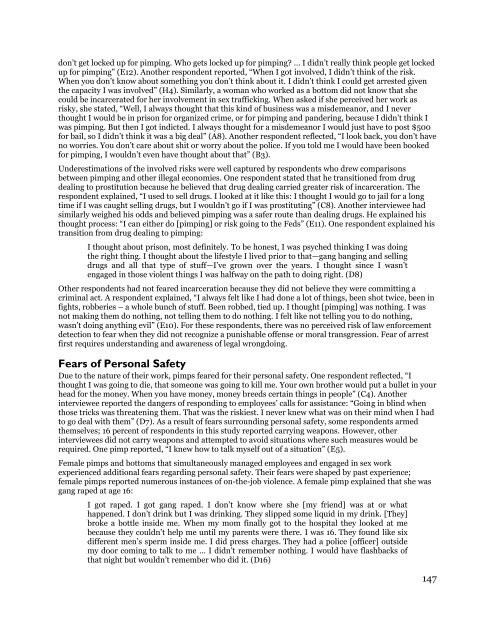413047-Underground-Commercial-Sex-Economy
413047-Underground-Commercial-Sex-Economy
413047-Underground-Commercial-Sex-Economy
You also want an ePaper? Increase the reach of your titles
YUMPU automatically turns print PDFs into web optimized ePapers that Google loves.
don’t get locked up for pimping. Who gets locked up for pimping … I didn’t really think people get locked<br />
up for pimping” (E12). Another respondent reported, “When I got involved, I didn’t think of the risk.<br />
When you don’t know about something you don’t think about it. I didn’t think I could get arrested given<br />
the capacity I was involved” (H4). Similarly, a woman who worked as a bottom did not know that she<br />
could be incarcerated for her involvement in sex trafficking. When asked if she perceived her work as<br />
risky, she stated, “Well, I always thought that this kind of business was a misdemeanor, and I never<br />
thought I would be in prison for organized crime, or for pimping and pandering, because I didn’t think I<br />
was pimping. But then I got indicted. I always thought for a misdemeanor I would just have to post $500<br />
for bail, so I didn’t think it was a big deal” (A8). Another respondent reflected, “I look back, you don’t have<br />
no worries. You don’t care about shit or worry about the police. If you told me I would have been booked<br />
for pimping, I wouldn’t even have thought about that” (B3).<br />
Underestimations of the involved risks were well captured by respondents who drew comparisons<br />
between pimping and other illegal economies. One respondent stated that he transitioned from drug<br />
dealing to prostitution because he believed that drug dealing carried greater risk of incarceration. The<br />
respondent explained, “I used to sell drugs. I looked at it like this: I thought I would go to jail for a long<br />
time if I was caught selling drugs, but I wouldn’t go if I was prostituting” (C8). Another interviewee had<br />
similarly weighed his odds and believed pimping was a safer route than dealing drugs. He explained his<br />
thought process: “I can either do [pimping] or risk going to the Feds” (E11). One respondent explained his<br />
transition from drug dealing to pimping:<br />
I thought about prison, most definitely. To be honest, I was psyched thinking I was doing<br />
the right thing. I thought about the lifestyle I lived prior to that—gang banging and selling<br />
drugs and all that type of stuff—I’ve grown over the years. I thought since I wasn’t<br />
engaged in those violent things I was halfway on the path to doing right. (D8)<br />
Other respondents had not feared incarceration because they did not believe they were committing a<br />
criminal act. A respondent explained, “I always felt like I had done a lot of things, been shot twice, been in<br />
fights, robberies – a whole bunch of stuff. Been robbed, tied up. I thought [pimping] was nothing. I was<br />
not making them do nothing, not telling them to do nothing. I felt like not telling you to do nothing,<br />
wasn’t doing anything evil” (E10). For these respondents, there was no perceived risk of law enforcement<br />
detection to fear when they did not recognize a punishable offense or moral transgression. Fear of arrest<br />
first requires understanding and awareness of legal wrongdoing.<br />
Fears of Personal Safety<br />
Due to the nature of their work, pimps feared for their personal safety. One respondent reflected, “I<br />
thought I was going to die, that someone was going to kill me. Your own brother would put a bullet in your<br />
head for the money. When you have money, money breeds certain things in people” (C4). Another<br />
interviewee reported the dangers of responding to employees’ calls for assistance: “Going in blind when<br />
those tricks was threatening them. That was the riskiest. I never knew what was on their mind when I had<br />
to go deal with them” (D7). As a result of fears surrounding personal safety, some respondents armed<br />
themselves; 16 percent of respondents in this study reported carrying weapons. However, other<br />
interviewees did not carry weapons and attempted to avoid situations where such measures would be<br />
required. One pimp reported, “I knew how to talk myself out of a situation” (E5).<br />
Female pimps and bottoms that simultaneously managed employees and engaged in sex work<br />
experienced additional fears regarding personal safety. Their fears were shaped by past experience;<br />
female pimps reported numerous instances of on-the-job violence. A female pimp explained that she was<br />
gang raped at age 16:<br />
I got raped. I got gang raped. I don’t know where she [my friend] was at or what<br />
happened. I don’t drink but I was drinking. They slipped some liquid in my drink. [They]<br />
broke a bottle inside me. When my mom finally got to the hospital they looked at me<br />
because they couldn’t help me until my parents were there. I was 16. They found like six<br />
different men’s sperm inside me. I did press charges. They had a police [officer] outside<br />
my door coming to talk to me … I didn’t remember nothing. I would have flashbacks of<br />
that night but wouldn’t remember who did it. (D16)<br />
147


